【期末总复习】Unit 5 A party知识梳理+巩固练习(含答案)
文档属性
| 名称 | 【期末总复习】Unit 5 A party知识梳理+巩固练习(含答案) |
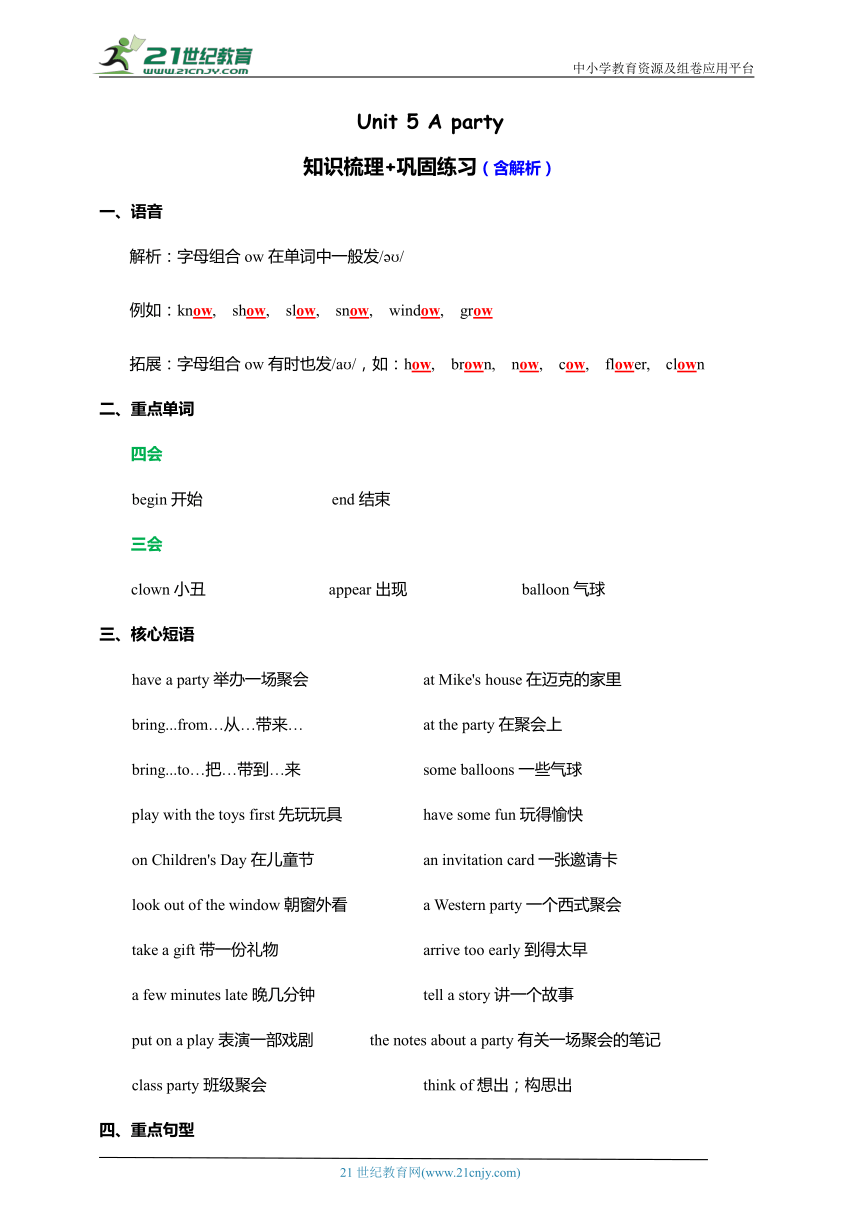
|
|
| 格式 | doc | ||
| 文件大小 | 1.2MB | ||
| 资源类型 | 试卷 | ||
| 版本资源 | 牛津译林版 | ||
| 科目 | 英语 | ||
| 更新时间 | 2023-06-03 00:00:00 | ||
图片预览

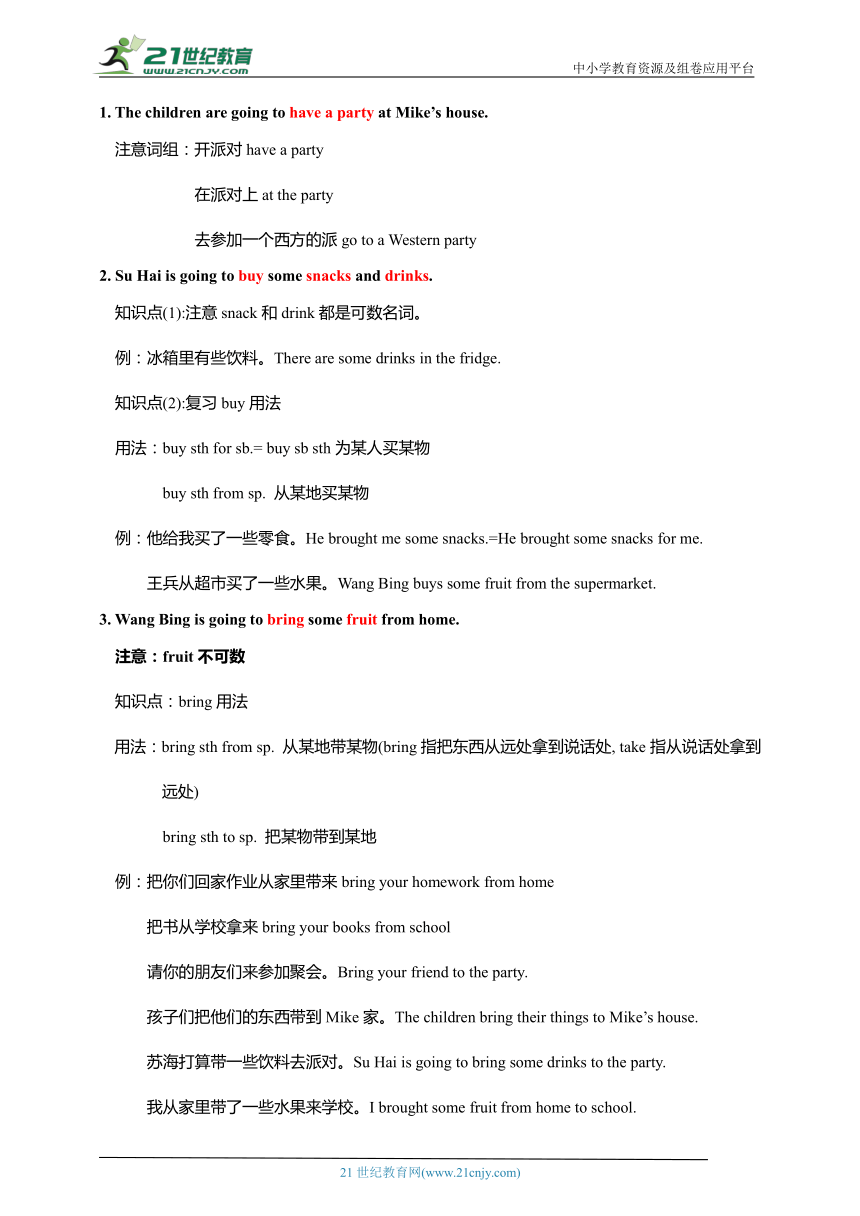
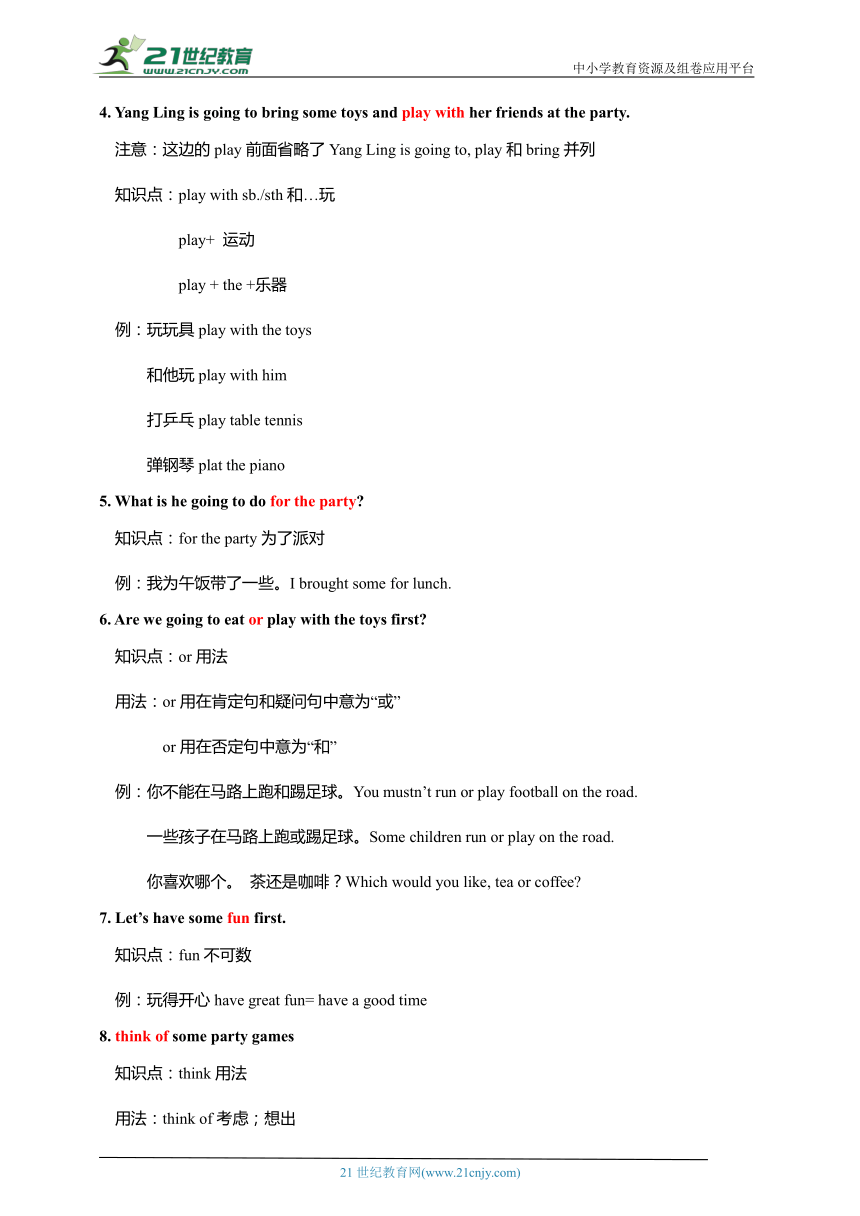
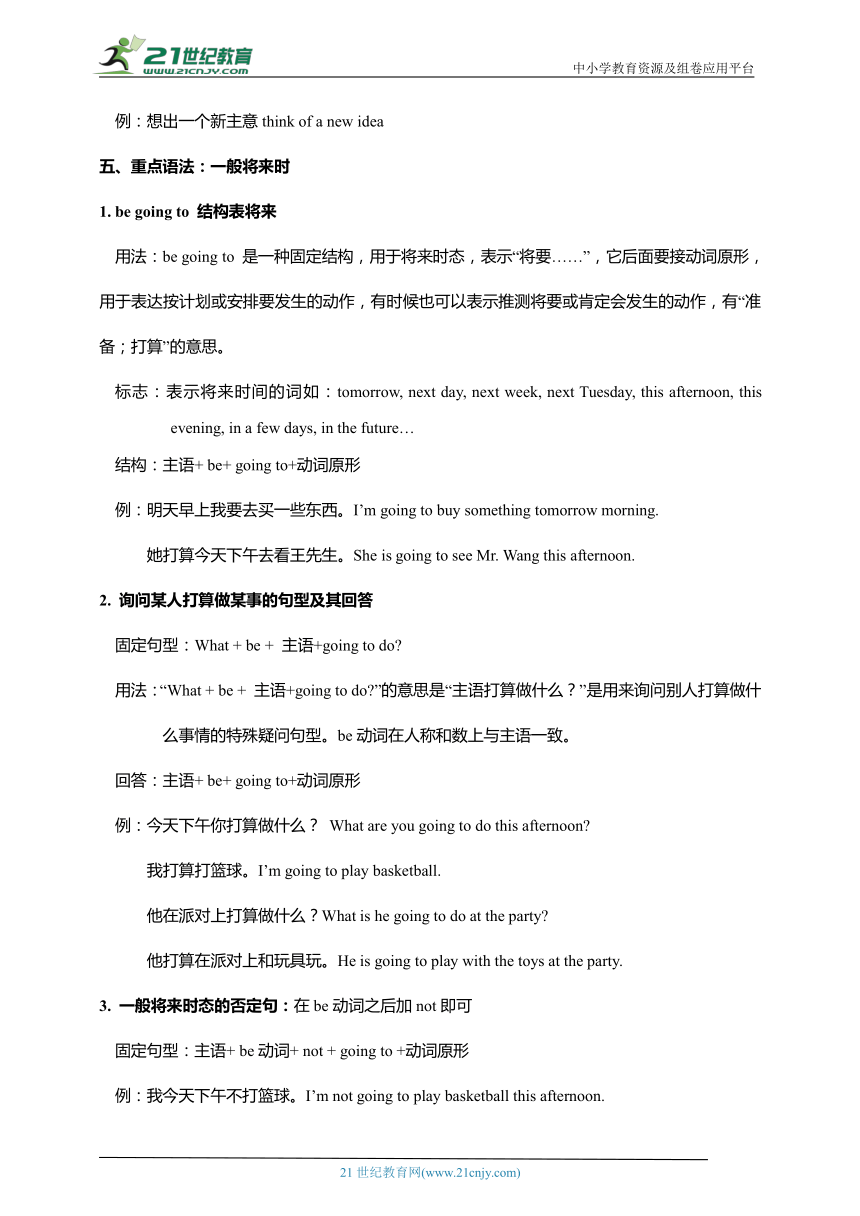
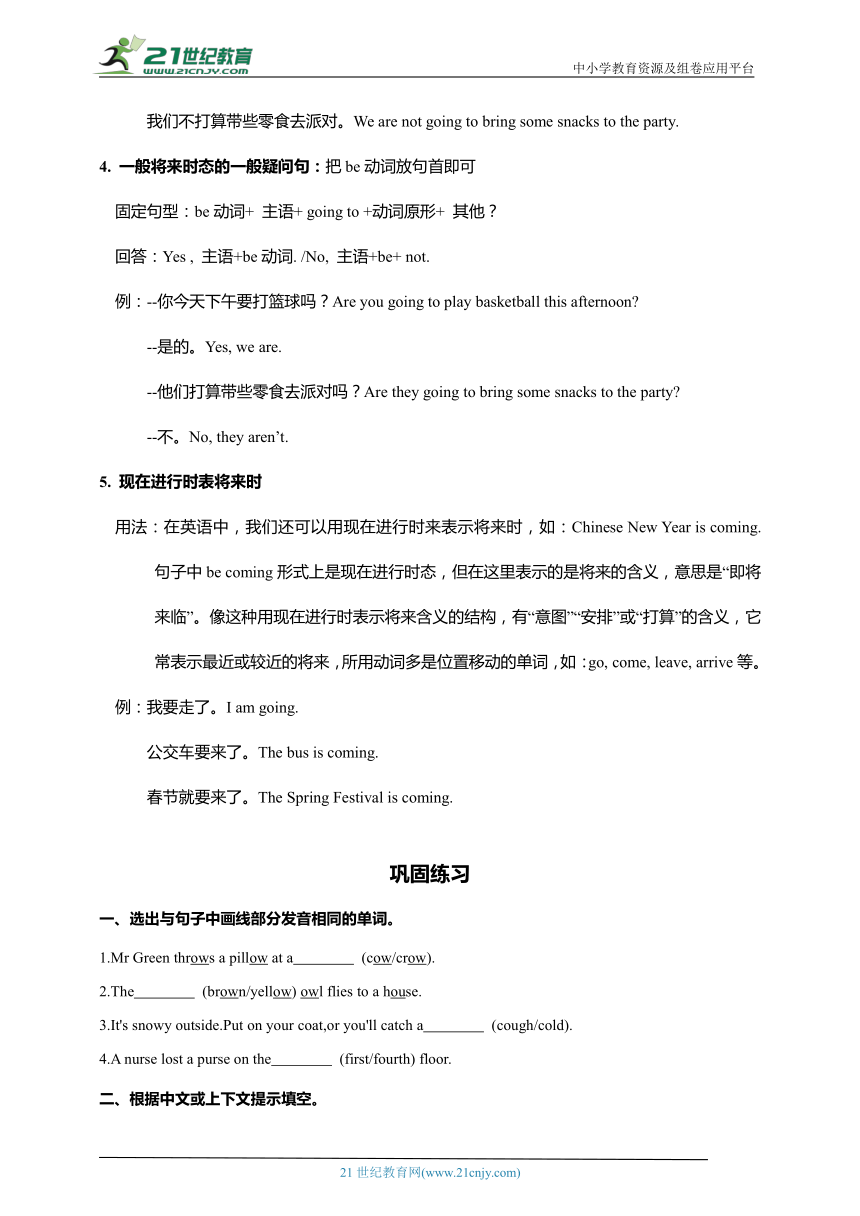
文档简介
中小学教育资源及组卷应用平台
Unit 5 A party
知识梳理+巩固练习(含解析)
语音
解析:字母组合ow在单词中一般发/ /
例如:know, show, slow, snow, window, grow
拓展:字母组合ow有时也发/a /,如:how, brown, now, cow, flower, clown
重点单词
四会
begin开始 end结束
三会
clown小丑 appear出现 balloon气球
核心短语
have a party举办一场聚会 at Mike's house在迈克的家里
bring...from…从…带来… at the party在聚会上
bring...to…把…带到…来 some balloons一些气球
play with the toys first先玩玩具 have some fun玩得愉快
on Children's Day在儿童节 an invitation card一张邀请卡
look out of the window朝窗外看 a Western party一个西式聚会
take a gift带一份礼物 arrive too early到得太早
a few minutes late晚几分钟 tell a story讲一个故事
put on a play表演一部戏剧 the notes about a party有关一场聚会的笔记
class party班级聚会 think of想出;构思出
重点句型
1. The children are going to have a party at Mike’s house.
注意词组:开派对have a party
在派对上at the party
去参加一个西方的派go to a Western party
2. Su Hai is going to buy some snacks and drinks.
知识点(1):注意snack和drink都是可数名词。
例:冰箱里有些饮料。There are some drinks in the fridge.
知识点(2):复习buy用法
用法:buy sth for sb.= buy sb sth为某人买某物
buy sth from sp. 从某地买某物
例:他给我买了一些零食。He brought me some snacks.=He brought some snacks for me.
王兵从超市买了一些水果。Wang Bing buys some fruit from the supermarket.
3. Wang Bing is going to bring some fruit from home.
注意:fruit不可数
知识点:bring用法
用法:bring sth from sp. 从某地带某物(bring指把东西从远处拿到说话处, take指从说话处拿到远处)
bring sth to sp. 把某物带到某地
例:把你们回家作业从家里带来bring your homework from home
把书从学校拿来bring your books from school
请你的朋友们来参加聚会。Bring your friend to the party.
孩子们把他们的东西带到Mike家。The children bring their things to Mike’s house.
苏海打算带一些饮料去派对。Su Hai is going to bring some drinks to the party.
我从家里带了一些水果来学校。I brought some fruit from home to school.
4. Yang Ling is going to bring some toys and play with her friends at the party.
注意:这边的play前面省略了Yang Ling is going to, play和bring并列
知识点:play with sb./sth和…玩
play+ 运动
play + the +乐器
例:玩玩具play with the toys
和他玩play with him
打乒乓play table tennis
弹钢琴plat the piano
5. What is he going to do for the party
知识点:for the party为了派对
例:我为午饭带了一些。I brought some for lunch.
6. Are we going to eat or play with the toys first
知识点:or用法
用法:or用在肯定句和疑问句中意为“或”
or用在否定句中意为“和”
例:你不能在马路上跑和踢足球。You mustn’t run or play football on the road.
一些孩子在马路上跑或踢足球。Some children run or play on the road.
你喜欢哪个。 茶还是咖啡?Which would you like, tea or coffee
7. Let’s have some fun first.
知识点:fun不可数
例:玩得开心have great fun= have a good time
8. think of some party games
知识点:think用法
用法:think of考虑;想出
例:想出一个新主意think of a new idea
重点语法:一般将来时
1. be going to 结构表将来
用法:be going to 是一种固定结构,用于将来时态,表示“将要……”,它后面要接动词原形,用于表达按计划或安排要发生的动作,有时候也可以表示推测将要或肯定会发生的动作,有“准备;打算”的意思。
标志:表示将来时间的词如:tomorrow, next day, next week, next Tuesday, this afternoon, this evening, in a few days, in the future…
结构:主语+ be+ going to+动词原形
例:明天早上我要去买一些东西。I’m going to buy something tomorrow morning.
她打算今天下午去看王先生。She is going to see Mr. Wang this afternoon.
2. 询问某人打算做某事的句型及其回答
固定句型:What + be + 主语+going to do
用法:“What + be + 主语+going to do ”的意思是“主语打算做什么?”是用来询问别人打算做什么事情的特殊疑问句型。be动词在人称和数上与主语一致。
回答:主语+ be+ going to+动词原形
例:今天下午你打算做什么? What are you going to do this afternoon
我打算打篮球。I’m going to play basketball.
他在派对上打算做什么?What is he going to do at the party
他打算在派对上和玩具玩。He is going to play with the toys at the party.
3. 一般将来时态的否定句:在be动词之后加not即可
固定句型:主语+ be动词+ not + going to +动词原形
例:我今天下午不打篮球。I’m not going to play basketball this afternoon.
我们不打算带些零食去派对。We are not going to bring some snacks to the party.
4. 一般将来时态的一般疑问句:把be动词放句首即可
固定句型:be动词+ 主语+ going to +动词原形+ 其他?
回答:Yes , 主语+be动词. /No, 主语+be+ not.
例:--你今天下午要打篮球吗?Are you going to play basketball this afternoon
--是的。Yes, we are.
--他们打算带些零食去派对吗?Are they going to bring some snacks to the party
--不。No, they aren’t.
5. 现在进行时表将来时
用法:在英语中,我们还可以用现在进行时来表示将来时,如:Chinese New Year is coming.句子中be coming形式上是现在进行时态,但在这里表示的是将来的含义,意思是“即将来临”。像这种用现在进行时表示将来含义的结构,有“意图”“安排”或“打算”的含义,它常表示最近或较近的将来,所用动词多是位置移动的单词,如:go, come, leave, arrive等。
例:我要走了。I am going.
公交车要来了。The bus is coming.
春节就要来了。The Spring Festival is coming.
巩固练习
选出与句子中画线部分发音相同的单词。
1.Mr Green throws a pillow at a (cow/crow).
2.The (brown/yellow) owl flies to a house.
3.It's snowy outside.Put on your coat,or you'll catch a (cough/cold).
4.A nurse lost a purse on the (first/fourth) floor.
根据中文或上下文提示填空。
1.Suddenly, a white bird (出现) and then it flew high.
2.The party is going to (开始) at half past eight and end(结束) at twelve o'clock..
3.It's on the first day of June.It's a day for children.It’s .
4.They have funny faces and they make people laugh.Most of them have a big red nose. They're.
5.They're small,thin,rubber bags.You can blow air into them and they can become bigger and rounder.They're not heavy at all. They're colourful and you can see them at the party.They're .
用所给单词的适当形式填空。
1.I (have) a party at home tomorrow.
2.My mother brought (I) a new doll.
3.--What the boys (do) next weekend
--They (buy) some books.
4.-- you (fly) kites with me tomorrow morning
--Yes, I .
单项选择。
( )1.-- are you going
--I'm going to the cinema.
A.What B.Where C.Who D.When
( )2.The bus came here.Just then,the rain .
A.is going to stop B.is stopping C.stops D.stopped
( )3.Here a few toys and some fruit for you.
A.have B.has C.is D.are
( )4.Tom often his homework in the evening.
A.don't;do B.doesn't;do C.doesn't;does D.didn't;do
( )5.Listen!The bird in the tree. It always in the morning.
A.sing;sings B.sings;sang C.is singing;sing D.is singing;sings
按要求完成句子或对话。
1.We're going to the park next Sunday.(对画线部分提问)
going to the park
2.He's watching TV now.(用tomorrow代替now)
He TV tomorrow.
3.I'm going to draw pictures this afternoon.(改为一般疑问句,并作否定回答)
-- going to draw pictures this afternoon
-- , .
4.They don't know how they can have a good time.(改为同义句)
They don't know how .
5.They're going to bring some fruit to the party.(对画线部分提问)
they the party
根据首字母和上下文提示填空。
1.When you go to a Western party,you can a on time or a few minutes late.
2.Class Five is going to p play called The Little Princess at the New Year party.
3.There is little s in Guangdong Province in winter.
4.My father often t a s to me before bedtime when I was a little child.
5.--Can you t of any party games
--What about hide-and-seek
单项选择。
( )1.The children a picnic tomorrow.
A.are going to have B.is going to have C.are going to be D.will to have
( )2.--I could control(控制)my feeling at that moment.
--That song brought back so many childhood memories(回忆).
A.really B.hardly C.nearly D.easily
( )3.-- is it from your school to your home
--Five minutes' walk.
A.How long B.How often C.How far D.How tall
( )4.--I've just received a WeChat message “ttyl”.Do you know
--It stands for“talk to you later'”.
A.how does it mean B.how it means
C.what does it mean D.what it means
从方框中选择合适的句子补全对话,有一项多余。
A: Hello,Su Hai.Your shoes look so nice!
B: 1.
A: 2.
B: I bought them yesterday at the shopping center.What about you 3.
A: I played football in the playground. It was great fun! 4. Would you like to come
B: 5. See you tomorrow
A: See you.
参考答案及解析
1.crow解析:throws/ / pillow/ / cow/a / crow/ /
2.brown解析:brown/a / yellow/ / owl/a / house/a /
3.cold解析:snowy/ / coat / / cough/ :/ cold/ /
4.first解析:nurse/ :/ purse/ :/ first / :/ fourth/ :/
1.appeared 2.begin/start 3.Children's Day 4.clowns 5.balloons
1.am going to have 2.me 3.are;going to do;are going to buy
4.Are;going to fly; am
1.B解析:根据答语句意“我将要去电影院。”可知问句是在询问对方要去哪里。A项“什么”;B项
“哪里”;C项“谁”;D项“什么时候”。故选B。
2.D解析:句意:公共汽车到了。就在那时,雨停了。just then表示“就在那时”,时态应与上句保持一致,所以此处也要用过去式,故选D。
3.D解析:考查倒装句。结构为:Here+谓语十主语。这里的谓语应该是不及物动词,而have是及物动词,所以不能用have/has,又根据横线后面a few toys为复数,应用be动词are,故选D。
4.B解析:由often可知用一般现在时,主语Tom是第三人称单数,故否定句中助动词应该选择第三人称单数形式doesn't;“做作业”为do one's homework,因句中出现了助动词,故此处用动词原形do,故选B.
5.D解析:根据题干中的Listen!可知,此处表达小鸟正在唱歌,第一空应该用现在进行时;而第二空根据关键词always可知,小鸟总是在早上唱歌,应该用一般现在时,又因为主语是第三人称单数,所以谓语动词应该用sings,故选D。
1.When are you 2.is going to watch 3.Are you;No;I'm not 4.to have fun
5.What are;going to do for解析:原句句意:他们打算带一些水果去聚会。针对“带水果”这一行为进行提问,也就是问他们打算为聚会做什么,故问句是“What are they going to do for the party ".
1.arrive 2.put on 3.snow
4.told;story解析:根据首字母可推测句意:在我小的时候,爸爸经常在睡前给我讲一个故事。“讲故事”tell a story为固定搭配,根据when I was a little child可知应用过去时。故填told;story.
5.think
1.A解析:根据题干关键词tomorrow可知,本题应该用一般将来时:“主语+will+动词原形”或者“主
语十be going to+动词原形”。因为主语children是复数,be动词应该选择are。故选A。
2.B解析:句意:我在那个时候几乎不能控制我的感情。A真正地;B几乎不;C几乎;D轻松地,容易地。故选B.
3.C解析:根据答语句意“5分钟的步行路程。”可知问句是在询问距离。A询问多长时间;B询问频率;C询问路程多远;D询问多高。故选C。
4.D解析:根据答语句意“它代表着稍后和你聊”。可知问句是在询问“你知道它是什么意思吗 ”。故疑问词用what。又因为问句是what引导的宾语从句,应该用陈述句语序,故选D。
1.E2.C3.A4.F5.D
A.What did you do yesterday
B.I'd love to,but I'll have a dancing lesson.
C.When did you buy them
D.Of course.I'd love to.
E.Thank you!
F.We're going to have another match tomorrow afternoon.
HYPERLINK "http://21世纪教育网(www.21cnjy.com)
" 21世纪教育网(www.21cnjy.com)
Unit 5 A party
知识梳理+巩固练习(含解析)
语音
解析:字母组合ow在单词中一般发/ /
例如:know, show, slow, snow, window, grow
拓展:字母组合ow有时也发/a /,如:how, brown, now, cow, flower, clown
重点单词
四会
begin开始 end结束
三会
clown小丑 appear出现 balloon气球
核心短语
have a party举办一场聚会 at Mike's house在迈克的家里
bring...from…从…带来… at the party在聚会上
bring...to…把…带到…来 some balloons一些气球
play with the toys first先玩玩具 have some fun玩得愉快
on Children's Day在儿童节 an invitation card一张邀请卡
look out of the window朝窗外看 a Western party一个西式聚会
take a gift带一份礼物 arrive too early到得太早
a few minutes late晚几分钟 tell a story讲一个故事
put on a play表演一部戏剧 the notes about a party有关一场聚会的笔记
class party班级聚会 think of想出;构思出
重点句型
1. The children are going to have a party at Mike’s house.
注意词组:开派对have a party
在派对上at the party
去参加一个西方的派go to a Western party
2. Su Hai is going to buy some snacks and drinks.
知识点(1):注意snack和drink都是可数名词。
例:冰箱里有些饮料。There are some drinks in the fridge.
知识点(2):复习buy用法
用法:buy sth for sb.= buy sb sth为某人买某物
buy sth from sp. 从某地买某物
例:他给我买了一些零食。He brought me some snacks.=He brought some snacks for me.
王兵从超市买了一些水果。Wang Bing buys some fruit from the supermarket.
3. Wang Bing is going to bring some fruit from home.
注意:fruit不可数
知识点:bring用法
用法:bring sth from sp. 从某地带某物(bring指把东西从远处拿到说话处, take指从说话处拿到远处)
bring sth to sp. 把某物带到某地
例:把你们回家作业从家里带来bring your homework from home
把书从学校拿来bring your books from school
请你的朋友们来参加聚会。Bring your friend to the party.
孩子们把他们的东西带到Mike家。The children bring their things to Mike’s house.
苏海打算带一些饮料去派对。Su Hai is going to bring some drinks to the party.
我从家里带了一些水果来学校。I brought some fruit from home to school.
4. Yang Ling is going to bring some toys and play with her friends at the party.
注意:这边的play前面省略了Yang Ling is going to, play和bring并列
知识点:play with sb./sth和…玩
play+ 运动
play + the +乐器
例:玩玩具play with the toys
和他玩play with him
打乒乓play table tennis
弹钢琴plat the piano
5. What is he going to do for the party
知识点:for the party为了派对
例:我为午饭带了一些。I brought some for lunch.
6. Are we going to eat or play with the toys first
知识点:or用法
用法:or用在肯定句和疑问句中意为“或”
or用在否定句中意为“和”
例:你不能在马路上跑和踢足球。You mustn’t run or play football on the road.
一些孩子在马路上跑或踢足球。Some children run or play on the road.
你喜欢哪个。 茶还是咖啡?Which would you like, tea or coffee
7. Let’s have some fun first.
知识点:fun不可数
例:玩得开心have great fun= have a good time
8. think of some party games
知识点:think用法
用法:think of考虑;想出
例:想出一个新主意think of a new idea
重点语法:一般将来时
1. be going to 结构表将来
用法:be going to 是一种固定结构,用于将来时态,表示“将要……”,它后面要接动词原形,用于表达按计划或安排要发生的动作,有时候也可以表示推测将要或肯定会发生的动作,有“准备;打算”的意思。
标志:表示将来时间的词如:tomorrow, next day, next week, next Tuesday, this afternoon, this evening, in a few days, in the future…
结构:主语+ be+ going to+动词原形
例:明天早上我要去买一些东西。I’m going to buy something tomorrow morning.
她打算今天下午去看王先生。She is going to see Mr. Wang this afternoon.
2. 询问某人打算做某事的句型及其回答
固定句型:What + be + 主语+going to do
用法:“What + be + 主语+going to do ”的意思是“主语打算做什么?”是用来询问别人打算做什么事情的特殊疑问句型。be动词在人称和数上与主语一致。
回答:主语+ be+ going to+动词原形
例:今天下午你打算做什么? What are you going to do this afternoon
我打算打篮球。I’m going to play basketball.
他在派对上打算做什么?What is he going to do at the party
他打算在派对上和玩具玩。He is going to play with the toys at the party.
3. 一般将来时态的否定句:在be动词之后加not即可
固定句型:主语+ be动词+ not + going to +动词原形
例:我今天下午不打篮球。I’m not going to play basketball this afternoon.
我们不打算带些零食去派对。We are not going to bring some snacks to the party.
4. 一般将来时态的一般疑问句:把be动词放句首即可
固定句型:be动词+ 主语+ going to +动词原形+ 其他?
回答:Yes , 主语+be动词. /No, 主语+be+ not.
例:--你今天下午要打篮球吗?Are you going to play basketball this afternoon
--是的。Yes, we are.
--他们打算带些零食去派对吗?Are they going to bring some snacks to the party
--不。No, they aren’t.
5. 现在进行时表将来时
用法:在英语中,我们还可以用现在进行时来表示将来时,如:Chinese New Year is coming.句子中be coming形式上是现在进行时态,但在这里表示的是将来的含义,意思是“即将来临”。像这种用现在进行时表示将来含义的结构,有“意图”“安排”或“打算”的含义,它常表示最近或较近的将来,所用动词多是位置移动的单词,如:go, come, leave, arrive等。
例:我要走了。I am going.
公交车要来了。The bus is coming.
春节就要来了。The Spring Festival is coming.
巩固练习
选出与句子中画线部分发音相同的单词。
1.Mr Green throws a pillow at a (cow/crow).
2.The (brown/yellow) owl flies to a house.
3.It's snowy outside.Put on your coat,or you'll catch a (cough/cold).
4.A nurse lost a purse on the (first/fourth) floor.
根据中文或上下文提示填空。
1.Suddenly, a white bird (出现) and then it flew high.
2.The party is going to (开始) at half past eight and end(结束) at twelve o'clock..
3.It's on the first day of June.It's a day for children.It’s .
4.They have funny faces and they make people laugh.Most of them have a big red nose. They're.
5.They're small,thin,rubber bags.You can blow air into them and they can become bigger and rounder.They're not heavy at all. They're colourful and you can see them at the party.They're .
用所给单词的适当形式填空。
1.I (have) a party at home tomorrow.
2.My mother brought (I) a new doll.
3.--What the boys (do) next weekend
--They (buy) some books.
4.-- you (fly) kites with me tomorrow morning
--Yes, I .
单项选择。
( )1.-- are you going
--I'm going to the cinema.
A.What B.Where C.Who D.When
( )2.The bus came here.Just then,the rain .
A.is going to stop B.is stopping C.stops D.stopped
( )3.Here a few toys and some fruit for you.
A.have B.has C.is D.are
( )4.Tom often his homework in the evening.
A.don't;do B.doesn't;do C.doesn't;does D.didn't;do
( )5.Listen!The bird in the tree. It always in the morning.
A.sing;sings B.sings;sang C.is singing;sing D.is singing;sings
按要求完成句子或对话。
1.We're going to the park next Sunday.(对画线部分提问)
going to the park
2.He's watching TV now.(用tomorrow代替now)
He TV tomorrow.
3.I'm going to draw pictures this afternoon.(改为一般疑问句,并作否定回答)
-- going to draw pictures this afternoon
-- , .
4.They don't know how they can have a good time.(改为同义句)
They don't know how .
5.They're going to bring some fruit to the party.(对画线部分提问)
they the party
根据首字母和上下文提示填空。
1.When you go to a Western party,you can a on time or a few minutes late.
2.Class Five is going to p play called The Little Princess at the New Year party.
3.There is little s in Guangdong Province in winter.
4.My father often t a s to me before bedtime when I was a little child.
5.--Can you t of any party games
--What about hide-and-seek
单项选择。
( )1.The children a picnic tomorrow.
A.are going to have B.is going to have C.are going to be D.will to have
( )2.--I could control(控制)my feeling at that moment.
--That song brought back so many childhood memories(回忆).
A.really B.hardly C.nearly D.easily
( )3.-- is it from your school to your home
--Five minutes' walk.
A.How long B.How often C.How far D.How tall
( )4.--I've just received a WeChat message “ttyl”.Do you know
--It stands for“talk to you later'”.
A.how does it mean B.how it means
C.what does it mean D.what it means
从方框中选择合适的句子补全对话,有一项多余。
A: Hello,Su Hai.Your shoes look so nice!
B: 1.
A: 2.
B: I bought them yesterday at the shopping center.What about you 3.
A: I played football in the playground. It was great fun! 4. Would you like to come
B: 5. See you tomorrow
A: See you.
参考答案及解析
1.crow解析:throws/ / pillow/ / cow/a / crow/ /
2.brown解析:brown/a / yellow/ / owl/a / house/a /
3.cold解析:snowy/ / coat / / cough/ :/ cold/ /
4.first解析:nurse/ :/ purse/ :/ first / :/ fourth/ :/
1.appeared 2.begin/start 3.Children's Day 4.clowns 5.balloons
1.am going to have 2.me 3.are;going to do;are going to buy
4.Are;going to fly; am
1.B解析:根据答语句意“我将要去电影院。”可知问句是在询问对方要去哪里。A项“什么”;B项
“哪里”;C项“谁”;D项“什么时候”。故选B。
2.D解析:句意:公共汽车到了。就在那时,雨停了。just then表示“就在那时”,时态应与上句保持一致,所以此处也要用过去式,故选D。
3.D解析:考查倒装句。结构为:Here+谓语十主语。这里的谓语应该是不及物动词,而have是及物动词,所以不能用have/has,又根据横线后面a few toys为复数,应用be动词are,故选D。
4.B解析:由often可知用一般现在时,主语Tom是第三人称单数,故否定句中助动词应该选择第三人称单数形式doesn't;“做作业”为do one's homework,因句中出现了助动词,故此处用动词原形do,故选B.
5.D解析:根据题干中的Listen!可知,此处表达小鸟正在唱歌,第一空应该用现在进行时;而第二空根据关键词always可知,小鸟总是在早上唱歌,应该用一般现在时,又因为主语是第三人称单数,所以谓语动词应该用sings,故选D。
1.When are you 2.is going to watch 3.Are you;No;I'm not 4.to have fun
5.What are;going to do for解析:原句句意:他们打算带一些水果去聚会。针对“带水果”这一行为进行提问,也就是问他们打算为聚会做什么,故问句是“What are they going to do for the party ".
1.arrive 2.put on 3.snow
4.told;story解析:根据首字母可推测句意:在我小的时候,爸爸经常在睡前给我讲一个故事。“讲故事”tell a story为固定搭配,根据when I was a little child可知应用过去时。故填told;story.
5.think
1.A解析:根据题干关键词tomorrow可知,本题应该用一般将来时:“主语+will+动词原形”或者“主
语十be going to+动词原形”。因为主语children是复数,be动词应该选择are。故选A。
2.B解析:句意:我在那个时候几乎不能控制我的感情。A真正地;B几乎不;C几乎;D轻松地,容易地。故选B.
3.C解析:根据答语句意“5分钟的步行路程。”可知问句是在询问距离。A询问多长时间;B询问频率;C询问路程多远;D询问多高。故选C。
4.D解析:根据答语句意“它代表着稍后和你聊”。可知问句是在询问“你知道它是什么意思吗 ”。故疑问词用what。又因为问句是what引导的宾语从句,应该用陈述句语序,故选D。
1.E2.C3.A4.F5.D
A.What did you do yesterday
B.I'd love to,but I'll have a dancing lesson.
C.When did you buy them
D.Of course.I'd love to.
E.Thank you!
F.We're going to have another match tomorrow afternoon.
HYPERLINK "http://21世纪教育网(www.21cnjy.com)
" 21世纪教育网(www.21cnjy.com)
同课章节目录
